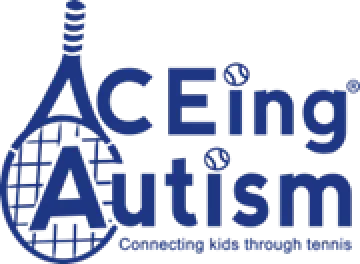The CACTI Blog: ACEing Autism - My Experience Connecting Kids Through Tennis

By Samantha Zwillinger, 2021-2022 Undergraduate Certificate In Developmental Disabilities
I really enjoyed my experience volunteering with ACEing Autism, a program for children with autism to learn tennis. During my junior year at the University of Arizona, I worked towards an undergraduate certificate in developmental disabilities through the Sonoran Center for Excellence in Disabilities. This program provided me with opportunities in the community to gain firsthand experience interacting with individuals with disabilities. I am grateful for this experience because ACEing Autism provided a way for me to become involved in the autism community. ACEing Autism allowed me to combine my passion for tennis with my passion for working with children, specifically children with autism. I enjoyed volunteering with this program because I learned how to develop skills in working with families and individuals with disabilities, and their communities. As a future speech pathologist, I know I will be working with children with autism as I get into the field. Primary experience with children is one of the most important traits a speech pathologist can have. Being able to interact with children with autism has given me a foundation for similar experiences I might face as a speech pathologist.

During my experience with ACEing Autism, I led activities and promoted socialization with the children, I interacted with families, and had one-on-one experiences with students. Before the program started, I interacted with families to discuss their child’s challenges and strengths. I developed a relationship with one specific family in the program. The parents told me that their child was very quiet, had few friends, and was not very active. I was drawn to work with this child because his parents shared with me their gratitude for the opportunity this program has given their whole family.
While ACEing Autism is a group-based tennis program, volunteers are matched up with one to two children each week to provide more individualized support to participants in group activities. During the first week, I was matched up with the child I had met before the program started. He tended to stand far away from the other children and was unresponsive when I asked him questions. However, he was very focused on perfecting his tennis and hand-eye coordination skills. A good foundation of hand-eye coordination is needed to play tennis. I led group activities involving playing catch with another child or walking to the net while balancing a tennis ball on a racket. Half the time is spent practicing with hand and ball skills while the other half is spent learning how to play tennis.
Another focus of the sessions is social interaction. Surrounding children with other people like them is a good way to promote social interaction. When I worked with the child who liked to be alone, I focused on involving him with other kids through group activities. This exposure was something he had not experienced before. Including him in a group promoted confidence and inspired him to talk with others. Children with autism often struggle with interacting with new people and making friends. At ACEing Autism, I learned how important group-based activities are at encouraging communication among children. They promote inclusivity.
This program is making a difference in the lives of children with autism. Children on the autism spectrum are less likely to be active than children who aren't on the spectrum because they have fewer opportunities. There is a lack of access for people with autism to participate in physical activity programs. This is in part because their social and motor skill differences are not accommodated. The child that I individually worked with showed improvements in his socialization skills and physical activity when he was given an equal opportunity to participate. ACEing Autism works to improve independent social skills so that the children may access greater opportunities in their community. By unifying children with autism, there is little room for discrimination. This allows for shared and positive social experiences. ACEing Autism’s practices are uniquely targeted towards children with autism, unlike generalized physical activity programs. Having a program that promotes a safe environment and educates people about disability is essential for the larger disability community.
This program connects to the broader community and disability related issues because it helps reduce attitudinal, environmental, and social barriers. One way that ACEing Autism reduces barriers is with the promotion of inclusion by bringing families together and strengthening the overall disability community. Knowledge about autism and other disability-related issues is important for everyone in the community. ACEing Autism is a program that promotes inclusion among the autism community as well as other communities related to disability.
The CACTI Blog features the voices of our interdisciplinary trainees and Community Advisory Council members as they highlight diverse images of people with disabilities and provide community information and advocacy on disability issues. Check Out The CACTI Blog
